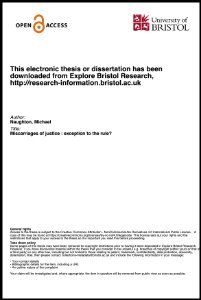By Valerie Jenness and Alexis Rowland
A growing body of research reveals that transgender people are disproportionately in contact with the criminal legal system, wherein they experience considerable discrimination, violence, and other harms. To better understand transgender people's involvement in this system, this article synthesizes research from criminology, transgender studies, and related fields as well as empirical findings produced outside of academe, to conceptualize a “transgender criminal legal system nexus.” This article examines historical and contemporary criminalization of transgender people; differential system contact and attendant experiences associated with police contact, judicial decision-making, and incarceration; and pathways to system involvement for transgender people. The analytic focus is on cultural logics related to institutionalized conceptualizations of gender, discriminatory people-processing in various domains of the criminal legal system, and institutionally produced disparities for transgender people involved in the criminal legal system, especially transgender women of color. The article concludes with a discussion of directions for future research, including a focus on administrative violence, organizational sorting, intersectionality, and measurement challenges.
Annual Review of Criminology, Volume 7, Page 283 - 309






